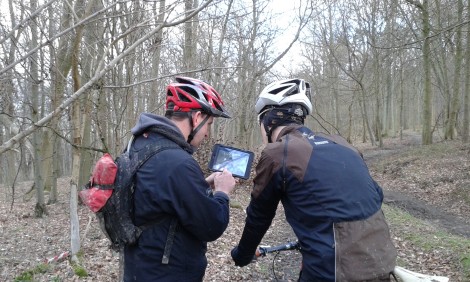Mountain bikers, or at least most male ones, are inveterate fettlers. Always tweaking a bit of bike set-up, getting excited about a new piece of kit, or boring everyone stupid about tyre or shock pressures. And even those that don’t do this probably spend considerable amounts of money on servicing for their bikes. And those of us that want to race also spend a lot of time getting fit enough to do so.
However, I reckon the vast majority of riders spend only the barest amount of time working actively on their riding skills, if at all. We go out and have fun riding, and the more we ride, hopefully the faster we get. But it has often struck me as odd, for such a technical sport, that mountain bikers don’t get more professional input to the technical side of their riding. Compare this to skiing, for instance, for which it seems entirely natural to spend a few hours of a week’s holiday getting some technical instruction. An odd contrast. So this post is by way of a manifesto for skills coaching courses everywhere.
There seem to be increasing numbers of these, but I suspect a lot of experienced riders might instinctively turn their noses up at these, or at least never get round to doing one. “I can ride my bike”; yes, but can you ride it as fast as if you had a few tips along the way?
No doubt we could all identify some basic pieces of technique, whether it’s about looking where you want to go rather than at things you want to avoid hitting, or where to put your weight over different types of terrain, or which foot to drop when. But I’ve now been for two long skills sessions with Ian Warby of Firecrest MTB and have found that it has opened my eyes to a whole new world of thinking about the way I ride.
I wouldn’t want to reveal all of Ian’s trade secrets, and I’ve found that it takes him giving the explanations to really make it work, but some of the nuggets that have really worked for me have been things like always thinking about dropping the wrists, getting my weight ‘behind’ the bike and pushing it through corners. Or indeed pushing it through a technical section, or into a manual. And really dropping the outside foot round a corner; one of the best teaching techniques Ian uses is to video you riding and then play it back instantly on an iPad. That revealed that while my brain was telling me my foot was down, it was actually well in front of the vertical, something I would never otherwise have known. And Ian managed to get me opening my hips more and using them to steer – a habit that I can now work on in my own time.
Another point was about looking well ahead on the trail; something we could probably all identify as a good habit, but one which is hard to get into. Ian talks about looking to the furthest point on the trail that you can see; and using a timing gate on a 30 second piece of trail revealed that there were whole seconds to be gained by employing this technique.
One of the sessions really opened my eyes to the benefits of pumping, or “energy management”, as Ian describes it. He has built a pump track at Aston Hill, north-west of London, where he does his sessions. It’s a simple, fairly short loop, but I found it very impressive to watch Ian ride the entire loop repeatedly, without pedalling, just using the berms and bumps to maintain momentum. Needless to say, I was unable to replicate this feat, although I could feel that it would eventually be possible; I could also feel that it could teach a lot about how to carry speed on a normal trail.
Part of the benefit of having been on this type of course is always having a mental toolkit to fall back on. If I’m struggling, or feeling that I’m riding a bit raggedly, or tensing up, I can think ‘push’ and get myself back on track.
The effects
This is inevitably subjective. But I’m convinced that just six hours spent over two sessions with someone really carefully and scientifically telling me what to do has significantly improved my riding. Even if it’s to a large degree psychosomatic (which I don’t believe is the case), that itself can only help.
So there you go – my manifesto for going on a skills course. I can personally recommend Firecrest, but there are others out there, no doubt including wherever you do your riding. Give it a go – you might be surprised.

